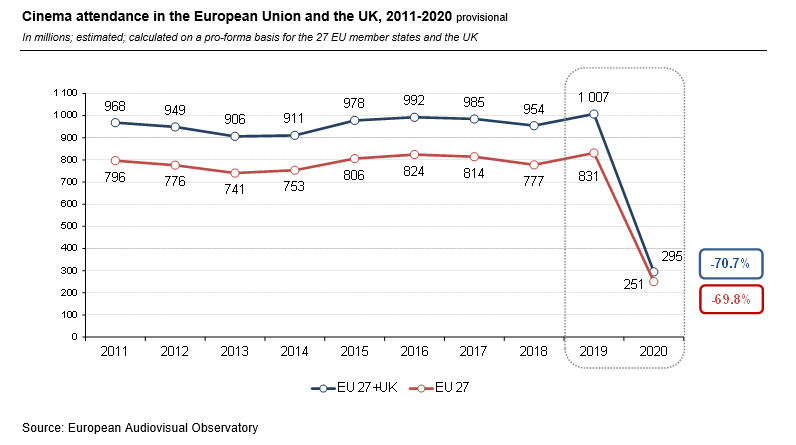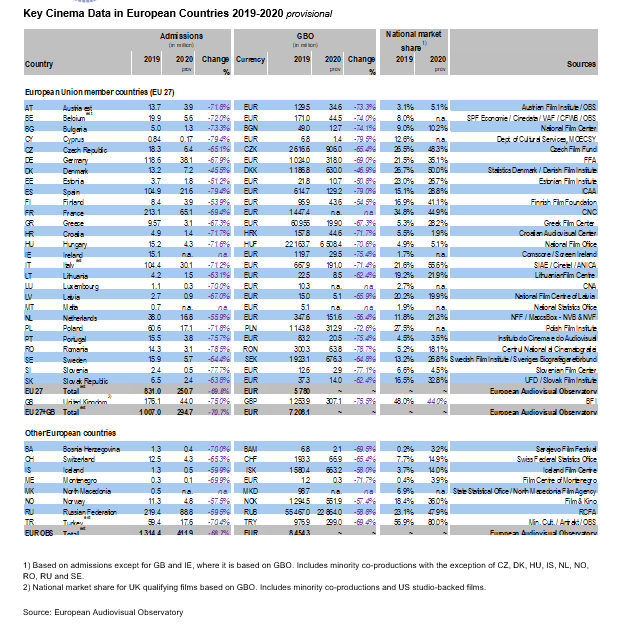Based on preliminary data the European Audiovisual Observatory estimates that cinema attendance in the European Union and the United Kingdom plummeted to 294.7 million admissions in 2020.
- This is 712.3 million ticket sales fewer than in 2019, representing a decline of 70.7%.
- A similar decrease (69.8%) was registered in the European Union only (EU27), where admissions dropped from 831.0 million to 250.7 million, for a total loss of 580.3 million tickets.
- Taking into account other European territories outside the EU and the UK, admissions plunged by 68.7% in 2020, falling from 1.4 billion to 411.9 million.
This staggering decline is clearly the result of the COVID-19 crisis, as the prolonged closure of cinemas across Europe, coupled with other restrictive measures, took a heavy toll on the exhibition sector. The massive crash came after a very positive 2019, when cinema attendance in the EU and UK had crossed the barrier of 1 billion admissions for the first time since 2004.
1. A major plunge in cinema attendance observed in all EU territories
On average, admissions dropped by 68.0% in the EU with only seven market registering a year-on-year decline below 65%: Denmark (-45.5%, -6.0 million admissions), Estonia (-51.2%, -1.9 million), Finland (-53.9%, -4.5 million), the Netherlands (-55.9%, -21.3 million), Lithuania (-63.1%, -2.6 million), the Slovak Republic (-63.8%, -4.2 million) and Sweden (-64.4%, -10.2 million). The decrease in cinema attendance was significantly above the EU average in Spain (-79.4%, -83.3. million admissions), Cyprus (-79.4%, -0.7 million), Romania (-78.5%, -11.2 million), Slovenia (-77.7%, -0.5 million) and Portugual (-75.7%, -11.8 million).
2. A similar story outside of the EU
Outside of the EU, the UK registered a major downturn in ticket sales which fell by 75.0% to 44.0 million (-132.1 on 2019). Russia recorded by far the largest admissions volume in Europe for 2020 with 88.8 million tickets sold (-59.5% on 2019) as cinemas in the country gradually reopened from July (amid capacity restrictions and depending on regional regulations). In Turkey, ticket sales fell by 70.4% to 17.6 million, down from 59.4 million in 2019.
3. Shortage of US blockbusters produced an increase in national market share
The first available figures suggest that in this exceptional year the shortage of US blockbusters led to an increase in national market share in the majority of European markets compared to 2019. In the EU, Italy recorded the highest national market share with domestic films capturing 55.6% of admissions. Ranking second was Denmark, with a national market share of 50.0%, ahead of the Czech Republic (48.3%) and France (44.9%). Other EU markets with a significant increase in the national market shares include Finland (41.1%), the Slovak Republic (32.8%), Spain (28.8%) and Greece (28.2%).
Outside the EU, Turkey confirmed its leading position in terms of national market share with Turkish films generating 80.0% of admissions in 2020. Russia also saw its national market share increase from 23.1% to 47.9%. Conversely in the UK the national market share (including US studio-backed films) dropped from 48.0% to 44.0%.
4. Top-ranking films in the EU and UK for 2020
Provisional figures confirm that the top-ranking films in the EU and UK for 2020 include 1917 (US/GB), Tenet (US/GB), Sonic: The Hedgehog (US/JP) and Star Wars: The Rise of Skywalker (US).
Notes:
- Data have been collected with the collaboration of the EFARN (European Film Agency Research Network).
- All 2020 figures are provisional.
Our next cinema figures will be released just before the Cannes Film international du film.
To be added to our press listings, send an email to: [email protected]


